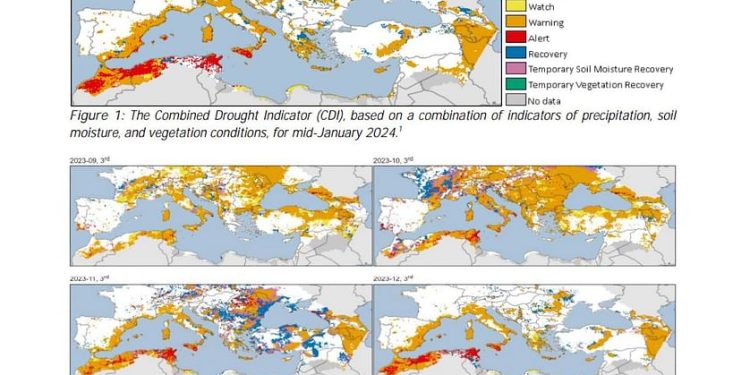#Agriculture #Mediterraneanregion #Drought #Waterscarcity #Climatechange #Sustainableagriculture #Cropprotection #Innovation #PataFESTproject
The Mediterranean region has long grappled with the harsh reality of drought, and the situation is only expected to worsen with the anticipation of a warmer-than-average spring in 2024, as highlighted in the Joint Research Centre (JRC) report “Drought in the Mediterranean Region – January 2024”. This prolonged dry spell has significantly impacted water resources, particularly in coastal regions of the Iberian Peninsula, Mediterranean islands, and northern Africa. Already, water use restrictions have been enforced in parts of Spain, Portugal, and Morocco, signaling the urgent need for sustainable water management strategies.
Moreover, the diminishing snowpack in Italy, a vital water source, adds to the region’s water scarcity concerns. This scarcity directly affects agricultural activities, with drying soils hampering crop growth and productivity. The JRC’s warning of increased wildfire risks further compounds the challenges faced by farmers and agricultural communities, particularly in coastal Spain and northern Africa.
In response to these pressing issues, there is a growing imperative to embrace innovative approaches to agricultural practices and crop protection. With rising temperatures exacerbating the spread of plant health diseases, such as those affecting potatoes, initiatives like the PataFEST project are at the forefront of promoting sustainable pest management and post-harvest storage solutions. By prioritizing research and development in these areas, stakeholders aim to safeguard agricultural livelihoods and ensure food security amidst changing climate conditions.
The looming drought crisis in the Mediterranean region underscores the urgent need for proactive measures to mitigate its impact on agricultural production. By embracing innovative solutions and sustainable practices, stakeholders can work towards safeguarding water resources, enhancing crop resilience, and securing food supplies for future generations. Collaboration between scientists, farmers, and policymakers is crucial in addressing these challenges and building a more resilient agricultural sector in the face of climate change.







